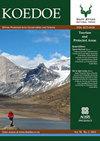环境水管理中的适应性和变革性学习:南非克鲁格国家公园鳄鱼河生态保护区的实施
IF 1.1
4区 环境科学与生态学
Q3 BIODIVERSITY CONSERVATION
引用次数: 3
摘要
人类世的特点是以前所未有的速度和规模普遍丧失生物多样性(Kingsford, Bino & Porter 2017a)。在全球范围内,淡水领域的生物多样性丧失最为严重(Albert et al. 2021;Vorosmarty et al. 2010),其单位面积物种多样性最高(Pittock et al. 2015)。在过去的半个世纪里,河流自然流量的改变——土地利用变化、水资源过度抽取和水坝建设——导致淡水物种数量减少了80%以上(Harwood et al. 2017;世界自然基金会2020 -淡水地球生命力指数)。目前,世界上三分之一的河流流域严重缺水(Harwood et al. 2017),因此,人类世淡水生物多样性的质量和数量下降,增加了对成功的环境水管理的需求,以维持对人类有益的生态系统服务。在世界上的河流流域中,有三分之一现在严重缺水,这使得维持或恢复淡水生态系统完整性所需的水的质量和数量日益紧迫。然而,由于社会和生物物理系统组成部分相互作用的复杂性和不确定性,以及实施环境流动的成本和收益之间的权衡,管理环境水是复杂的。通过学习实现适应性管理——拥抱不确定性——至关重要;然而,实践适应性管理(在全球范围内)是具有挑战性的;解决复杂问题需要单环、双环和三环学习,以及社会学习。南非鳄鱼河的环境流动(生态保护区)正在逐步实现,与克鲁格国家公园相连,使用战略适应性管理(SAM)。在这篇研究文章中,我们反思了自适应(单环和双环)学习和变革性(三环)学习能力在2009年至2019年期间出现的SAM,同时也考虑了社会学习潜力。我们在新兴的利益相关者“实践社区”中发现了社会学习的先决条件(例如透明度)的证据,这可能会促进持续社会学习的能力(例如信息共享)。社会学习使适应性和变革性学习成为可能,并以支持评估和反思的持续嵌套反馈为基础,从而促进单环、双环和三环学习。冠军是存在的,对维持适应性管理系统至关重要。实施适应性和变革性学习有助于在生态、社会和经济成果方面产生积极变化,这对全球环境水方案的成功至关重要。本文章由计算机程序翻译,如有差异,请以英文原文为准。
Adaptive and transformative learning in environmental water management: Implementing the Crocodile River’s Ecological Reserve in Kruger National Park, South Africa
The Anthropocene is characterised by ubiquitous loss of biodiversity at unprecedented rates and scales (Kingsford, Bino & Porter 2017a). Globally, this biodiversity loss is severest across the freshwater realm (Albert et al. 2021; Vorosmarty et al. 2010), which exhibits the highest species diversity per unit area (Pittock et al. 2015). Over the last half century, alteration to natural flows in rivers – from land-use change, water over-abstraction and building of dams – has contributed towards more than 80% reduction in the freshwater species population (Harwood et al. 2017; WWF 2020 – Freshwater Living Planet Index). Currently, one-third of the world’s river basins are severely water depleted (Harwood et al. 2017), thereby, rendering the quality and quantity of water to Freshwater biodiversity loss in the Anthropocene escalates the need for successful environmental water management to sustain human benefitting ecosystem services. Of the world’s river basins, one-third are now severely water depleted, rendering the quality and quantity of water to maintain or restore freshwater ecosystem integrity increasingly urgent. However, managing environmental water is intricate because of complexity and uncertainty in interacting social and biophysical system components, and trade-offs between costs and benefits of implementing environmental flows. Learning enabled adaptive management – embracing the uncertainty – is essential; however, practising adaptive management (worldwide) is challenging; single-, doubleand triple-loop learning is required, along with social learning, to tackle complex problems. There is progressive realisation of environmental flows (Ecological Reserve) in the Crocodile River, South Africa, linked to the Kruger National Park, using Strategic Adaptive Management (SAM). In this research article, we reflected on adaptive (singleand double-loop) learning and transformative (triple-loop) learning capacity emergent in SAM between 2009 and 2019 whilst also considering social learning potentials. We found evidence of preconditions (e.g. transparency) for social learning within a burgeoning stakeholder ‘community-of-practice’, likely fostering capacities (e.g. information sharing) for sustained social learning. Adaptive and transformative learning is enabled by social learning, underpinned by ongoing nested feedbacks supporting assessment and reflection, which facilitates single-, doubleand triple-loop learning. Champions exist and are vital for sustaining the adaptive management system. Executing adaptive and transformative learning aids in positive change across the range of ecological, social and economic outcomes that are essential for success in environmental water programmes, worldwide.
求助全文
通过发布文献求助,成功后即可免费获取论文全文。
去求助
来源期刊

Koedoe
BIODIVERSITY CONSERVATION-
CiteScore
3.30
自引率
0.00%
发文量
10
审稿时长
20 weeks
期刊介绍:
Koedoe, with the subtitle ''African Protected Area Conservation and Science'', promotes and contributes to the scientific (biological) and environmental (ecological and biodiversity) conservation practices of Africa by defining the key disciplines that will ensure the existence of a wide variety of plant and animal species in their natural environments (biological diversity) in Africa.
 求助内容:
求助内容: 应助结果提醒方式:
应助结果提醒方式:


